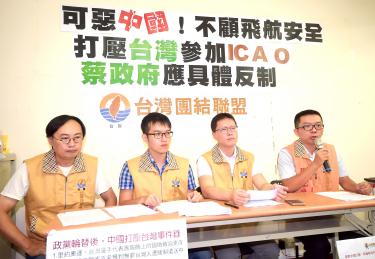The Taiwan Solidarity Union (TSU) yesterday urged the government to take measures in response to China’s obstruction of Taiwan’s participation in this year’s International Civil Aviation Organization (ICAO) assembly in Canada, with the party calling on the government to openly denounce Beijing and reject the so-called “1992 consensus.”
The TSU said the government should take action in response to Beijing’s hostility after China’s Taiwan Affairs Office on Friday last week attributed Taiwan’s exclusion from the assembly to the Democratic Progressive Party (DPP) government’s refusal to acknowledge the “1992 consensus.”
The “1992 consensus” — a term former Mainland Affairs Council chairman Su Chi (蘇起) admitted making up in 2000 — refers to a supposed understanding between the Chinese Nationalist Party (KMT) and the Chinese government that both sides acknowledge there is “one China,” with each side having its own interpretation of what “China” means.
TSU Publicity Department deputy director Chen Chia-lin (陳嘉霖) said the nation’s exclusion from the ICAO assembly once again highlights China’s agenda to coerce Taiwan to the point of removing it from a nonpolitical flight safety body.
Since the DPP administration assumed office, Beijing has suppressed Taiwan’s international presence by silencing Minister of Health and Welfare Lin Tzou-yien (林奏延) at the World Health Assembly in May and expelling Taiwanese officials from a meeting of the UN Food and Agriculture Organization’s Committee on Fisheries in July, Chen said, adding that these moves are aimed at forcing President Tsai Ing-wen (蔡英文) to accept the “1992 consensus.”
“The government can no longer continue the soft attitude of former president Ma Ying-jeou’s (馬英九) administration, but has to affirm its resolve to improve the nation’s international visibility,” Chen said.
Tsai has adopted a mild and ambiguous attitude toward China, but she has to start taking concrete action against Beijing’s suppression, he said.
The government should enact a law prohibiting any Chinese who have committed human rights violations from entering Taiwan; ban those who are involved in Beijing’s “united front” operations from Taiwan; seek alliances with activists, religious leaders and dissidents oppressed by China, such as the Dalai Lama and exiled World Uyghur Congress president Rebiya Kadeer; and abolish the Straits Exchange Foundation and replace the Mainland Affairs Council with a new department in the Ministry of Foreign Affairs to normalize cross-strait relations, the TSU said.
The government should call an international news conference to reject the “1992 consensus” because it is an under-the-table deal between the Ma administration and the Chinese Communist Party (CCP), which cannot be imposed on the new government elected on a new mandate, TSU Youth Department director Hou Tsung-ying (侯宗穎) said.
“Did China stop its hostility when the Ma administration accepted the ‘1992 consensus’? Were Taiwanese involved in a telecom fraud from a base in Kenya not deported to China during Ma’s term?” TSU Department of Organization director Chang Chao-lin (張兆林) asked.
A draft bill by the TSU caucus to ban Chinese who have committed human rights violations from entering Taiwan did not pass the floor in the KMT-dominated legislature last year, but the new government and the new legislature should revive the legislation as a first step to counter China’s actions, Chang said.
China has the KMT as its partner, as the KMT directed its criticism against the DPP government instead of the Chinese government following Taiwan’s exclusion from the ICAO, Chang said, calling on the KMT to cease collaborating with Beijing against Taiwan’s interest.
The TSU has not ruled out inviting the Dalai Lama and Kadeer to Taiwan if the government does not take on the initiative, he added.
Source: Taipei Times - 2016/09/26





















